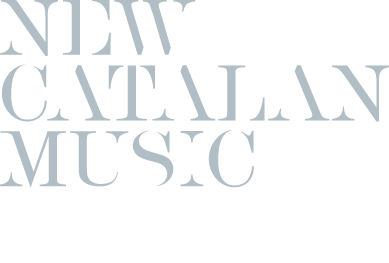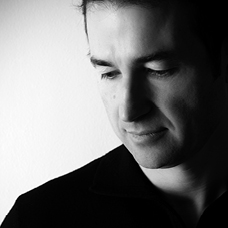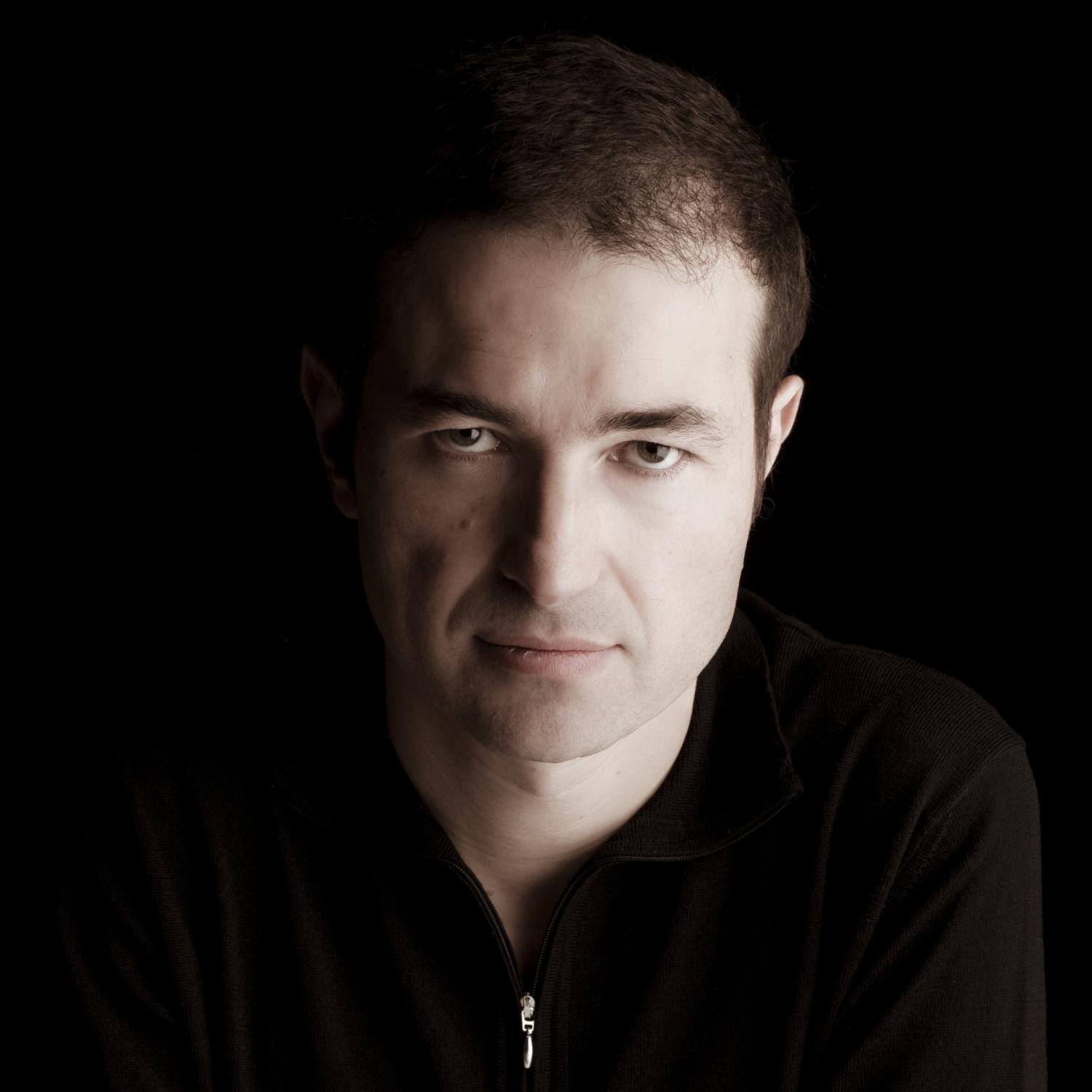Ramon Humet
Contemporary music
(Ramon Humet, Barcelona 1968)
He is a composer as well as a technical engineer in telecommunications. Once a student of Gerry Weil and Harriet Serr in Caracas (1986-89), he studied composition and instrumentation with Josep Soler and piano with Miquel Farré. One of the most appreciated Catalan composers among the new generations, his work received significant international praise by winning the Composition award Olivier Messiaen 2007 for his work Escenas de pájaros, also awarded by the Reina Sofía in 2006.
Twelve minutes long and inspired by the song of various bird species, this piece was premiered by the Montreal Symphony Orchestra on January 10, 2007 at the Theâtre de Maisonneuve de Montreal, and was conducted by Jean-François Rivest. The performance made it to Madrid shortly after in October, performed by the RTVE orchestra, and conducted by Adrian Leaper. It took place in Barcelona for the first time during the festival Nous Sons in March 2009, performed by the Orquestra Simfònica de Barcelona i Nacional de Catalunya (OBC), with Rubén Gimeno as the conductor.
A composer of fine sensibility and solid technique, which comes together in a refined personal language, Jonathan Harvey has described him as an artist who is “delicate and subtle, with great poetic imagination”. Many of his works are oriental influenced and also express a big love for nature. Some are: The Voice of the Devil (2000), for flute and guitar; Encanteris (2000), only for piano; 3 Nocturns (2001), for soprano saxophone and orchestra symphony, winner of the Composition prize Joaquín Rodrigo-Villa de Madrid in 2005; Mantra II (2002), for a percussion group; Escenes del bosc, an album for piano structured into four books (2004-2007); ...from the meadows (2006), for flute, saxophone, piano, percussion and electronics; and Jardín de haikus (2007), for a chamber group, commissioned by the Centro para la Difusión de la Música Contemporánea (CDMC).
Humet is an imaginative, vital and charismatic musician who knows how to bring his musical thought together with the most varied expressive and instrumental technique. In a continual process of purifying language, he has conceived an original series made up of four independent pieces with many connections between them, united under the title Música del no ésser, in which he displays a large timbral refinement, subtle atmospheres and tonal charm that just go to show the key role his interest in philosophy and traditional Japanese music play in his creative process. Música del no ésser is inspired by a short posthumous poem by the Zen monk Daido Ichi’i: «La música del no ésser / omple el buit: / sol de primavera, / blancor de neu, / núvols brillants, / vent transparent». The first movement, titled Sol de primavera (2009), premiered on May 3, 2009, at the Auditorio Nacional de Música in Madrid. It was performed by the Jove Orquestra Nacional de Catalunya (JONC) and conducted by Manel Valdivieso. The second movement (which in fact was the first one released) Vent transparent (2008, rev. 2009) was premiered on August 14, 2008 by the Orquesta de Cámara del Auditorio de Zaragoza-Grupo Enigma and was conducted by Juan José Olives, at the Festival de Músiques de Torroella de Montgrí (Catalonia). The two pages that conclude the series –Blancor de neu (2009-10) and Núvols brillants (2010)– were written as a commission of the Orquestra Simfònica de Barcelona i Nacional de Catalunya (OBC) and the Fundación Autor, and both premiered at the Auditori de Barcelona on September 24, 2010, with Pablo González as the conductor.
His symphony works also include Escenas de viento (2007-2008), commissioned by the Orchestre Symphonique de Montréal, which premiered on September 30, 2008, with Jacques Lacombe conducting, and Gagaku (2007-2008), an orchestra piece inspired by the ancient Japanese musical genre, awarded with the XVII Premi internacional de composició Ciutat de Tarragona. It was premiered in Tarragona by the OBC and conducted by Eiji Oue on July 2, 2009.
Gradually showing more interest in the concert genre, Humet showcases yet again his inspiration and talent in Concert per a piano i conjunt instrumental «And the world was calm». This work was commissioned by the group Barcelona 216 and on March 5, 2010 at the Festival Ars Musica of Belgium, it was premiered by the pianist Jordi Masó –to whom it is dedicated to– and Barcelona 216, and conducted by Ernest Martínez Izquierdo, the same performers who would record the work that same year at the Auditori de Barcelona. His chamber catalogue has also reached a high point with Pètals (2009), for piano, violin and cello, commissioned and performed by the Trio Kandinsky on December 11, 2009, at the Munetsugu Hall of Nagoya, during a concert tour through Japan. Also that year, the cellist Oriol Aymat and the pianist Silvia Vidal premiered El jardí de Kinko (2008), at the Festival Nous Sons de Barcelona, and the pianist Alberto Rosado presented to La Pedrera de Barcelona the fourth book of Escenes del bosc, commissioned by the Fundació Caixa Catalunya.
From 2011 on, he began to write scores for choir with works like Salve Montserratina (2010-2011) and Tres Ofertoris (2012), both premiered by the Escolania de Montserrat. During the 2013-14 concert season, he was named Resident Composer at the Palau de la Música Catalana and as a result, brought us pieces like El conte de l’àvia, Cant d’amor a la vida and Pau al Cor, specially written for vocal ensembles from this same musical institution.
The composer has recently made his debut in choral music with Salve Montserratina (2010-2011), for children’s choir and organ, premiered on March 6, 2011, at the Basílica de Montserrat (Catalunya) by the Escolania de Montserrat, conducted by its leader, Bernat Vivancos.
In 2012, Humet’s catalogue has included two monograph albums that gather some of his most important symphony and chamber scores. The symphonic album offers live recordings of the premieres of Música del no ésser and Concert per a piano i conjunt instrumental «And the world was calm», while the second is new, recorded in London in 2011 with the prestigious London Sinfonietta conducted by Nicholas Collon, that features three chamber pieces: Quatre jardins zen, Jardí de haikus and Pètals.
He made his debut in opera with Sky Disc, an opera-oratory for nine vocal soloists, mixed choir and symphonic orchestra, inspired by the idea and the libretto of the British playwright Rebecca Simpson, which premiered at the Halle Opera in Germany on October, 2, 2013, with Andreas Henning as conductor and Gert-Hagen Seebach as stage designer.





 twitter
twitter flickr
flickr facebook
facebook RSS
RSS spotify
spotify youtube
youtube
